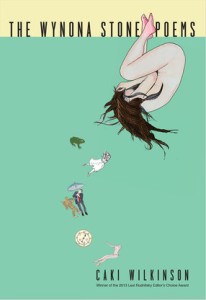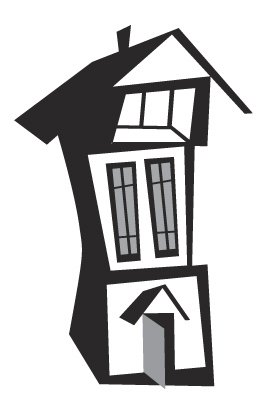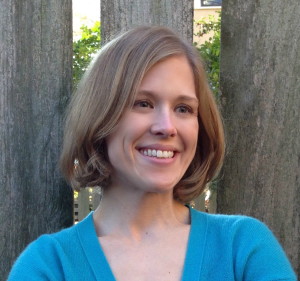 Book Title, Press, Year of Publication:
Book Title, Press, Year of Publication:
The Wynona Stone Poems, Persea Books, 2015
Synopsis: Poems focused on the life of a fictional woman named Wynona Stone.
What do you think makes your book (or any book) a “project book”?
A project book is any book with a unifying principle that can be summarized in a sentence or two. It’s a book with a hook, and (sometimes? always?) a book that reads both as a poetry collection and one long poem.
Why this subject (or constraint)?
I’ve always had a pretty strong impulse towards fiction and narrative, so I’m drawn to poems with developed characters: poetic series, epics, verse drama—any work that follows a character through time. I remember in college thinking this was something only Homer and Vergil and Medieval poets got to do, but then I read The Dream Songs and Omeros, and later Weldon Kees’s Robinson poems and Maurice Manning’s Lawrence Booth’s Book of Visions, and I was blown away. These projects suggested an alternative to the personal lyrics I was so used to reading, a way to be inside and outside myself at the same time. That said, as much as I love contemporary poetry’s heroes and antiheroes, they’re almost always men, so I wanted to write a series of poems centered on a female character. And, with the exception of the Weatherman, most of the other characters in the book are women as well: Lois (Wynona’s boss and antagonist), her cosmetologist, and her dead friend Nancy.
Was your project defined before you started writing? To what degree did it develop organically as you added poems?
Before I started the project, I had a loose outline for something pretty different. I knew that I wanted a Wynona-like figure, but I thought maybe the point of view would shift between a few different characters and storylines, soap-opera style. I wanted most of the scenes to be set at a living history museum (i.e., somewhere like Colonial Williamsburg or the gazillion less impressive sites kids visit on fieldtrips). I had done a bunch of research on costumed interpreters and museology and heterotopias, just pages and pages of stuff, but the museum plot never took off. Wynona was in the first poem I wrote, which is still the first poem in the book, and right away her story took over. (She does work at a museum, but it only shows up in a handful of poems.)
Did you fully immerse yourself in writing this project book, or did you allow yourself to work on other things?
While I was working on the first draft I fully immersed myself, and that was really important for me—especially in the beginning when I was just getting my footing. I had a fellowship and for several months I wasn’t teaching or working, just writing (or not writing but thinking about writing). It was intense and also wonderful to get to live inside Wynona’s world for a while. Later, when I moved back to Tennessee and started a new job, it wasn’t very hard to keep the poems alive; Wynona and Pleasant Bluff made more sense to me by then.
As you were writing, were you influenced by your experience or perception of how project books are received by readers and editors (either positively or negatively)? Do you feel differently about your book being defined as a “project book” now that it has been published than you did when you were writing it?
Initially I worried that no one would want to read a bunch of poems about a made-up, mostly mediocre woman, but at some point it stopped bothering me. The stakes felt pretty low, and ultimately that was a relief; it freed me up to be as playful or dark or weird as I wanted.
As I was finishing the first draft of the manuscript I had a conversation with another poet who asked me what I’d been working on. When I mentioned Wynona, already feeling a little sheepish, the poet responded consolingly, “Well, those project books are very hard to pull off.” I don’t know if I anticipated this reaction or caused it, but it was the first time I remember hearing the term “project book.” The comment (or maybe the demonstrative pronoun?) gave me an abstract sense of the dissenting view, but I wasn’t all that surprised. I think project books might be slightly more polarizing than regular poetry collections, but not by much.
As a reader, are you drawn to project books? What project books have influenced you or have you enjoyed, and what do you think makes those books successful?
Yes, I’m definitely drawn to project books. To the list of character-driven books mentioned above I would add William Meredith’s Hazard, the Painter, Julie Sheehan’s Bar Book, and Amy Newman’s Dear Editor. I read Bar Book while I was still working on Wynona and Dear Editor right after I finished; both books feature female narrators, and they’re the perfect mix of smart and sad and funny.
A few other favorites, sticking with books from the last forty or fifty years, are Ellen Bryant Voigt’s Kyrie, Michael Ondaatje’s The Collected Works of Billy the Kid, and James Merrill’s The Book of Ephraim—really all of The Changing Light at Sandover, but that’s moving into epic territory.
Before reading most of these books, I was a little suspicious. How could (or why would) someone write a whole book of poems about the 1918 flu pandemic, or about two people messing around with Ouija boards, or a collection consisting entirely of submission letters to an imaginary editor? But all of these books hooked me early on. They work in part because they’re willing to go big: they tackle unruly subjects that would be difficult to address in a single poem; they justify their length. And, too, they’re all thinking about the big questions of poetic form: what can I do within this constraint, and how can I transcend it? The best of these books have stuck with me in ways that traditional poetry collections sometimes don’t; beyond their various hooks, there’s a cumulative effect that’s hard to describe.
After completing a project, how did you transition into writing something new? What are you working on now? Another project?
As others have noted, it’s been a tough transition. (I loved Brian Russell’s response to this one!) I grew pretty attached to Wynona and to the security and structure of an ongoing project. After I finished the book, my first instinct was to start a new series or book-length poem, but the territory felt too familiar—I couldn’t get excited about it. I realized what I probably needed most was to work in a mode I don’t understand. As I mentioned before, I’ve always leaned towards story in my poems, so lately I’ve been experimenting with shorter lyrics, trying to figure out exactly what I can accomplish in a more compressed space. These poems require a lighter touch and quicker moves than I’m used to—and I’ve written a bunch of duds—but I like the way short poems can sneak up on you. When one works it often involves a turn or ending I didn’t see coming.
What advice can you offer other writers, particularly emerging writers or poetry students who may be using the project book as a guiding principle for their own work?
My main advice is to write the poems that make you want to write more poems. Whatever form or thought or image makes you want to do the work, trust that it’s worth the effort. But don’t get too comfortable either. I think it’s good to feel a little out of control, a little out of your element. If you’re boring yourself you’ll definitely bore everyone else.
Also, give yourself some rules, because restraint done right is productive and creative and satisfying, but don’t give yourself too many rules. This can be especially tempting with project books; you’ve already decided to write a bunch of poems in the voice of different minerals, so why not put all the sulfates in Sapphics and the silicates in syllabics? Actually that might be fine, I don’t know, but my point is whatever shape you’ve willed your manuscript to take, leave room for the lines and poems you never planned to write.


